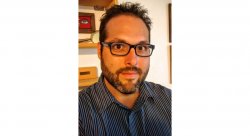Faculty Spotlight: Religion Assistant Professor John Soboslai
Posted in: Faculty Spotlight, Homepage News and Events, Religion

John Soboslai, assistant professor in Religion, received a PhD from the University of California, Santa Barbara. His research interests include: the comparative study of religious violence and the relationship between religion and the state in an increasingly interconnected global society. He teaches courses such as Death, Dying, and the Afterlife, Religion and Culture, and Religion and Politics.
Tell us about your current research.
Right now I’m working on using immersive technologies to create interactive virtual reality experiences of religious rituals. Sponsored by a National Endowment of the Humanities grant, I hosted a workshop last year that brought together immersive media creators, digital humanists, and scholars from several disciplines to lay the groundwork for how to use 360-degree filming and 3D sound technology to capture live rituals. Incorporating interviews with scholars, religious professionals, and practitioners alongside informational overlays and 3D renderings of ritual implements, the project promises to bring users into spaces while providing reliable information about the procedure, symbolism, and meanings.
Recently I launched a partnership with the Martin Marty Center for the Public Understanding of Religion at the University of Chicago, and together we intend to create a set of resources over the next 2 years. In addition, I’m working with Montclair State faculty colleagues in the School of Communication and Media to outline pilot experiential learning classes where students would take the lead in the research, planning, and recording of these experiences, including developing skills in highly prized digital media skills.
Talk about the importance of your work from your perspective as a humanities scholar or social scientist – Why does it matter for society? What makes it valuable to our students?
Religion is an issue of perpetual interest, but too often students don’t know what we do in the study of religion. Allowing students to witness ‘first-hand’ the religious practices of others can help radically increase intercultural understanding and empathy. Recording rituals would require partnering with local religious communities and collaboratively determining how to represent their practices in a balance between insider knowledge and outsider analysis. Using VR in humanities classrooms has been shown to increase retention, advance learning outcomes, and engage students in deep and long-lasting ways. Virtually entering into the religious spaces that are unfamiliar–as well as getting perspectives on spaces that are familiar–can advance our appreciation of diversity and demystify practices students have never encountered. If all of this can be delivered in classes where students take the lead in production from start to finish, it can be an educational opportunity with an impact that extends far beyond the university.
What makes your approach to teaching and research unique or innovative?
First, by integrating new media into teaching about religion we can harness new technologies towards activating students’ interest and imagination. By integrating interactivity into these resources, students are given agency over learning experiences that transport them to the spaces wherein religious life takes place. Second, the ability to approximate presence at sacred spaces without leaving the campus can capitalize on the benefits from popular “site visit” activities with much greater flexibility and fewer resources. Lastly, guiding students through the creation stages of VR experiences will not only give them skills highly attractive for numerous careers, but also show them what is possible in this new world of immersive media.
Do you have a favorite course to teach?
I routinely teach a RELG 101: Understanding Religion course a few times a semester and I absolutely love it. Exposing students to the logics of religion and the varieties of practice is extremely rewarding. We spend time looking at how understanding religion and religious behavior is a necessity in modern law, politics, and society at large. The course offers an opportunity not merely to introduce new information, but to change ways of thinking about a subject as ubiquitous as it is misunderstood.
What’s your favorite thing about Montclair State?
Without a doubt the people. The students are kind and thoughtful, the members of my department are phenomenal people and scholars, and CHSS and Montclair as a whole I’ve found to be a really collaborative place.
What are your hopes/goals for your students as they become the next generation of professional and engaged citizens of the world?
Open-mindedness paired with an ability to critically reflect upon information is something our world desperately needs. I hope our students take the lead in promoting diversity and equality in whatever field they enter, and developing civic competencies that will enhance our national and global belonging.
